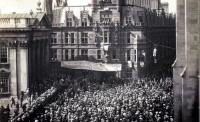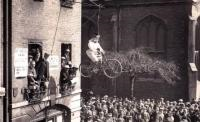And the votes are in. The University of Cambridge Senate has just voted for its new Chancellor. Senate rarely votes about anything, and the last time a Chancellor’s nomination was put to such a vote was in 1847 when Prince Albert beat off a challenge from the Earl of Powis, a graduate of St Johns who was nominated by others from that college. At that time things got somewhat mired, not only in college politics, but politics more broadly. I suspect the processes have got much more formalised through Statutes and Ordinances in recent years.
As a University Council member I was also automatically a member of the Nomination Committee who nominated David Sainsbury earlier this year as their candidate of choice. But this time there were 3 opposing candidates: the actor Brian Blessed, Michael Mansfield QC and a local shopkeeper Abdul Arain. So, over Friday and Saturday the centre of Cambridge was unusually busy with throngs of voters turning up.
It was a strangely moving experience, because of its rarity and because of the great sense of ceremony that was attached to it. I had not expected this at all. I first noticed it as I cycled at high speed past the Senate House on Friday afternoon (having missed the train from London I needed to catch to get back in good time for the beginning of term welcome to our new PhD students due to the vagaries of the Piccadilly line). The road outside Great St Mary’s was peopled with large numbers of gown-wearing alumni and alumnae many, it has to be said, leaning stiffly on walking sticks. The University Senate consists of anyone with a higher degree from the university and, since graduates of the university automatically qualify for an MA 7 years after matriculation, this means all but the most recent graduates are members, as are many of the senior staff with degrees from other universities who can also apply to be granted an MA. Friday afternoon was obviously the time when MA’s who matriculated many years ago were inclined to return.
I returned myself to vote rather later, at which point I was pleased to see there were no queues. I was able to dump my bike against a railing, don my gown and quickly cast my own vote. But even though I was glad to do it fast, I couldn’t help but be impressed by the way the whole operation was organised. No queues for me, and it was a bright sunny afternoon, but it seemed that everything had been thought through. There were many officials clad in cloaks and top hats, ushering the voters along under an awning – factoring in the possibility of rain – where there were chairs placed to assist the elderly if forced to queue. There was a convenient place where I could leave that rucksack I was hauling around with my luggage from my London trip, and there was the sense of an immense and efficient polling station as the ‘Regents’ were separated from the ‘Non-Regents’ (ie those who are currently members of the Regent House, broadly speaking current employees of the University, as opposed to those who were simply graduates), and rows of desks to deal with us alphabetically. Hot drinks were available too, I think in the recently re-opened University Combination Room. It was a very smooth operation, overseen by everyone from the Registry down as far as I could see: the Esquire Bedells, the Constables, the Proctors and the Vice-Proctors (such wonderful names these people have), and probably others whose titles I’ve never learnt, though they are equally efficient at every Congregation – degree awarding ceremony – I have presided over. Whatever one may think about this country, we do ‘do’ ceremonies rather well! Everyone was smiling and there was a strong sense of occasion. As I say, I found it surprisingly moving.
On the Saturday I returned again, when my husband went to vote in the afternoon. By this time the crowds were back (I believe when the poll had first opened on the Friday morning this had been the same, with queues described as winding all round the Senate House), but the average age was much lower than those I’d seen on the Friday afternoon. These were on the whole rather recent graduates. But, since most of them did not have gowns with them – gowns were of course available to borrow – I think many of them had probably come from outside Cambridge. The crowds did not quite match those seen back in 1897, shown in the photographs, when special trains were laid on from London to make sure voters could get back to oppose the admission of women. This time, a mere 5,558 valid votes were cast.

The scene outside the Senate House in 1897

Effigy of a bicycling woman suspended across from the Senate House in 1897
I am no fan of gowns, of paraphernalia or anachronisms, but somehow this sense of ceremony seemed fitting. I was really glad when Universal Council decided, shortly after I was elected to it nearly 3 years ago, that gowns no longer were really a necessary prerequisite for attendance. I would like to think my moans on the subject of having to stick my gown into my bicycle basket as I dashed across Cambridge for Council meetings (not for me the luxury of being able to walk to the Council Room from my college or department, since Physics is situated 1 1/2 miles from the centre of Cambridge), contributed to the swift change of mood about their necessity. One of the key arguments for retaining them was that the Council Room is so cold in winter that they were very desirable, an argument that I must admit has some force but which really can be dealt with in other less archaic ways.
So, now we have our new Chancellor, duly elected by a historic procedure. Lord Sainsbury was gracious throughout, saying perfectly reasonably
‘This is no longer the age of deference. An election is a good thing.’
I’m sure he will serve us well now the Nomination Committee’s nomination has been formally approved, and by a simple majority. Maybe next time we vote for a Chancellor of the University of Cambridge we will have moved on from such a cumbersome approach. If it is another 150+ years hence who knows what procedures might have taken over; there seems little point in thinking about whether it might involve dimpled chads or even online voting, Surprisingly I find myself hoping that actually, once every century or so, Senate will get a chance to don its gown (or someone else’s) and turn up to vote – and then have a cup of tea.
If you’re interested in a slightly different take on this, read Mary Beard’s account here.

Athene,
One point you do do not mention is the voting system. Is Cambridge University still wedded to the First Past the Post (as in parliamentary elections) or has it espoused preferential voting, which for a single place to be filled would be the Alternative Vote? If the former, did Lord David Sainsbury receive more votes than all the other candidates put together?
The only time that I have participated in one of these elections was as a member of the University of London Convocation in 1981, when Queen Elizabeth, the Queen Mother, decided to stand down and the establishment proposed Princess Anne to succeed her. This was not universally popular and two other candidates were proposed: Jack Jones, the retired Union leader, and Nelson Mandela, who at the time was still in prison on Robben Island. Mandela was proposed by a number of student leaders and, although he came third, he got my vote.
This was decided for the first time using a Single Transferable Vote system. In fact, Lord Sainsbury won on the first round, receiving more than all the other candidates put together. The full details and a brief statement from the new Chancellor can be found here.
Thanks for the insight into what sounds to my Colonial ears a completely overblown and ridiculous method of electing someone. But, as you say, if you’re a fan of pomp and ceremony I suppose it’s quite fun.
[Disclaimer – both of my parents read Physics at Cambridge – John’s and Girton, if you’re interested. I doubt either of them had much use for gowns etc. either.]
I am curious, however, as to how a local shopkeeper came to be nominated (or Brian Blessed, for that matter). Although I presume Chancellor is an (almost entirely?) ceremonial role, it still would seem a little silly to have someone so far outside of academia in the position, surely?
I believe Abdul Arain felt after the original nomination, that if one ‘grocer’ could stand, so could another. Brian Blessed came to the fore after a push by students who, I think, were confused about the Chancellor’s role in Cambridge, seeing it more as the Rector of a Scottish university, for whom actors are not infrequently proposed. I am not sure where the push for Michael Mansfield came from. All that is needed is 50 signatures of (I presume) eligible voters for a valid nomination to be made -by some specified date.
(I was a Girtonian physicist too so I’m curious when your mother was a student. Has she ever told you about the songs at the second year feast to celebrate the admission of women to full degrees?)
I’ve not heard about those songs… something to ask her I think! She would have been there finishing in about 1953 I think, although I might be off by a year or two.
“graduates of the university automatically qualify for an MA 7 years after matriculation”
Really?!
Doesn’t that devalue actual earned Masters degrees, or does the university not grant taught / research-based Masters degrees?
I believe my parents received theirs in the mail. 😉
oops, sorry about the extended italics!
Cath@VWXYNot – it used to be you had to pay for it, at a time when no such thing as taught masters existed I believe (a tradition going back a long time). The tradition of a quasi-automatic MA has remained, now without payment and despite the existence of MA’s by other means. But it is an MA Cantab, therefore distinguishing it from other types I guess.